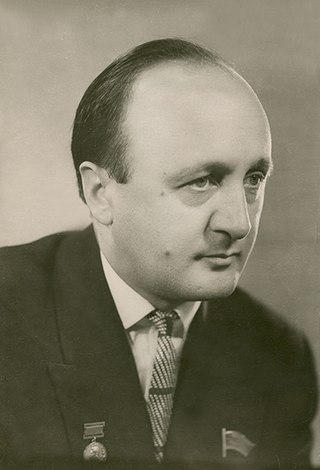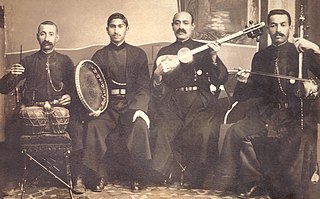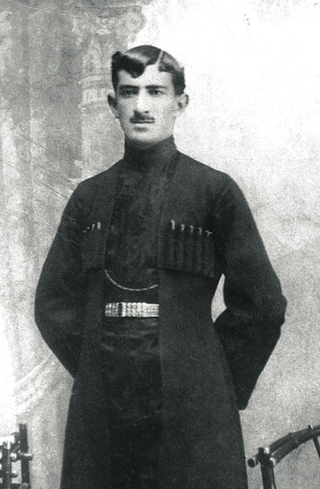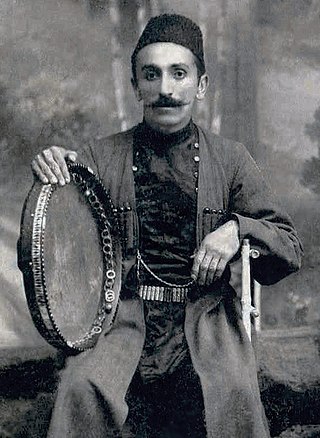
Uzeyir bey Abdulhuseyn oghlu Hajibeyov, known as Uzeyir Hajibeyov was an Azerbaijani composer, conductor, publicist, playwright, and social figure. He is recognized as the father of Azerbaijani composed classical music and opera. Uzeyir Hajibeyov composed the music of the national anthem of Azerbaijan Democratic Republic. He also composed the anthem used by Azerbaijan during the Soviet period. He was the first composer of an opera in the Islamic world. He composed that first oriental opera Leyli and Majnun in 1908 and since then Azerbaijani people have honored him for bringing to life the written masterpiece of the world literature.

Fikret Mashadi Jamil oghlu Amirov was a prominent Soviet and Azerbaijani composer.

Mugham or Mughamat is one of the many classical compositions from Azerbaijan, contrasting with tasnif and ashik.

Bulbul, was a famous Azerbaijani and Soviet opera tenor, folk music performer, and one of the founders of vocal arts and national musical theatre in Azerbaijan.

Tofig Alakbar oglu Guliyev was a Soviet and Azerbaijani composer, pianist, and conductor.

Azerbaijani dances are traditional dances developed and performed in the Republic of Azerbaijan. These dances are known for their quick tempo and the dancers' traditional clothing.
Haji Dadash oglu Khanmammadov was an Azerbaijani and Soviet composer. He is best known for writing the first concertos for the Azeri stringed folk instruments tar and kamancheh.

Jabbar Garyagdioglu or Garyaghdyoglu was an Azerbaijani folk singer (khananda). He is known as the first khananda to perform mughamats in the Azeri language. He mostly sang in Azerbaijani and Persian. He was widely known both as a khanende and as a composer who performed both folk songs and his own song compositions, he was the author of new texts - tesnifs. His song "Baku" enjoyed great popularity in the 1930s-1940s. Jabbar Karjagdyoglu was also known outside the Caucasus. The art of the singer was admired by Uzeir Hajibeyov and Fedor Shalyapin, Sergei Yesenin and Bulbul, Reingold Glier. In 1906-1912 his voice was recorded by a number of joint stock companies in Kiev, Moscow, Warsaw. In the Great Soviet Encyclopedia Karjagdy is called the biggest khanende, an expert in Azerbaijani folk music.

Said Rustamov, born Mir-Jabbar Ali oglu Seyid-Rustamzadeh, was a Soviet Azerbaijani composer and conductor.

Koroghlu is an opera in five acts by Uzeyir Hajibeyov to a libretto in Azerbaijani by Habib Ismayilov, with poetry by Mammed Said Ordubadi. The libretto is based on episodes from the Epic of Koroghlu, a heroic legend prominent in the oral traditions of the Turkic peoples. The opera premiered on April 30, 1937, at the Azerbaijan State Opera and Ballet Theater.

If Not That One, Then This One, also known as Mashadi Ibad is a 1910 Azerbaijani operetta in four acts written by composer Uzeyir Hajibeyov. The comedy reflects social and everyday life relations in prerevolutionary Azerbaijan. It is the composer's second work written in this genre, and is considered a national classic alongside the same composer's Arshin mal alan.
Azerbaijan participated in the Eurovision Song Contest 2013 with the song "Hold Me" written by Dimitris Kontopoulos, John Ballard and Ralph Charlie. The song was performed by Farid Mammadov. The Azerbaijani entry for the 2013 contest in Malmö, Sweden was selected through Milli Seçim Turu 2013, organised by the Azerbaijani broadcaster İctimai Television (İTV). Following eight semi-finals and a final on 14 March 2013, a six-member jury selected "Hold Me" performed by Farid Mammadov as the winner.

Farid Mammadov is an Azerbaijani singer. He represented Azerbaijan in the Eurovision Song Contest 2013 in Malmö with the song "Hold Me" and came second after Denmark.
Bayaty-Shiraz is a musical modal system in traditional mugham music.

Fakhraddin Gahraman oglu Atayev is an Azerbaijani conductor.

Galib Mammadov is an Azerbaijani-Norwegian composer. He is influenced by both Western and Eastern music traditions and composed a wide range of musical pieces for various instruments and orchestras.

Ganja State Philharmonic Hall is a concert hall in Ganja, Azerbaijan. Ganja State Philharmonic is named after the composer Fikret Amirov who was born in Ganja in 1922 and directed the Philharmonic for a while (1942-1943).

Riad Mammadov - pianist, musicologist, performer of jazz and classical music. At the invitation of Theodor Currentzis, he was appointed special musical adviser to the opening ceremony of the First European Games of 2015 in Baku. He is a member of music festivals in Russia, Azerbaijan, Canada. Riad Mammadov is one of several professional musicians in the world who work in the jazz-mugam genre.
Nushaba Alasgar gizi Hummatova is an Azerbaijani singer, actress, PhD in art history, and Honored Artist of the Republic of Azerbaijan.














